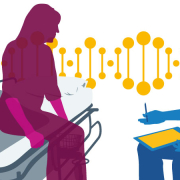GEP updates consent course including CPD credits
Developed to support clinicians at NHS GMCs, our consent course has been fully updated and now attracts 2 CPD credits from the Royal College of Physicians
As of 18 December 2015, the HEE Genomics Education Programme’s online course ‘100,000 Genomes Project: Preparing for the Consent Conversation’ has been updated in line with recent changes and clarifications to the Project’s protocol. The PDF version of the course has also been updated and is available to view, save and print.
In addition, we are pleased to announce that the Royal College of Physicians has awarded the course 2 CPD credits.
Learners who have previously completed the course should review the course updates, below, to ensure they remain up-to-date.
1. Additional looked-for findings
1a. Discussing the list of conditions:
Update: The emphasis around discussing ‘additional looked-for’ findings with participants has been clarified. These additional findings, which do not relate to the participant’s main condition, are based on a list of rare genetic variants of high clinical significance. As noted previously, this list will change over the course of the Project as new evidence emerges.
It is not reasonably practicable for clinicians to discuss this list of additional conditions with the participant in complete detail during the consent conversation. Therefore, clinicians should explain to the participant that they would be consenting to the general principle of receiving additional findings in relation to rare genetic variations that, if present, would likely result in illness that is severely or moderately life threatening, but where treatment and/or screening options are available in the NHS; for example, inherited breast and ovarian cancer or familial hypercholesterolaemia. It is estimated that about 1% of participants could receive an additional finding in their results.
Changes to the course:
- Wording in Units 2.3, 3.5 and the glossary amended to reflect the emphasis as noted above
- List of individual conditions and links to factsheets removed from Unit 2.3 (factsheets remain available as a general resource on the GEP website)
- A link to the Genomics England current list of additional looked-for findings added to Unit 2.3.
1b. Subsequent opt in / opt out:
Update: In a change to the Genomics England protocol, subsequent to the consent conversation participants may now change their decision at any time about opting into, or out of, receiving additional looked-for findings. To do this, they can complete a form, and return to Genomics England or their clinical team.
Changes to the course:
- Infographic in Unit 2.1 and wording in Units 2.2, 3.4 and 3.5 amended to reflect the change to the consent process as noted above, and a link added to the form
1c. Carrier status findings:
Update: Eligibility to opt in to receive carrier status findings is no longer restricted to parents of a proband with a rare disease. Now, any adult enrolled in the Project can opt in to carrier testing. As before, for autosomal recessive conditions (where both partners would have to carry the genetic variant to potentially pass on the disease to their child) both partners need to be enrolled and consent to this testing; for genetic conditions that could be passed on solely by that individual – for example, X-linked conditions – only the individual concerned is required to consent.
Changes to the course:
- Wording in Units 2.2, 2.3 and FAQs amended to reflect the change as noted above
2. Guidelines for rare disease proband and family selection
Update: Genomics England has issued new guidance around the optimal family structures for different inheritance patterns, clarifying the broad assumption of requiring a father and mother to complete a rare disease ‘trio’ of samples.
Changes to the course:
- Wording amended in Unit 1.3 and FAQs to reflect the change as noted above and a link to the document ‘Guidelines for Rare Disease Proband and Family Selection’.
3. List of participant and consultee literature
Update: The Genomics England participant and consultee literature has been amended to reflect changes to the protocol.
Changes to the course:
- The list of participant and consultee documents in Unit 2.1 has been updated to the most current list, and a link added for learners to access copies of the literature direct from the Genomics England website.
4. Taking a family histor
Update: A family history, or genetic pedigree, is now requested by Genomics England as part of the proband’s clinical data. This may be taken by the patient’s clinician separately to the consent conversation.
Changes to the course:
- Wording in Unit 1.4 and FAQs amended to reflect the change as noted above
CPD points awarded
The Genomics Education Programme is also pleased to announce that its consent course has recently been awarded 2 CPD credits by the Royal College of Physicians.
Previous learners can generate a new copy of their completion certificate with the CPD credits confirmed. Simply log in, click on ‘My profile’, and then ‘End-of-course assessment – Print certificate’.









